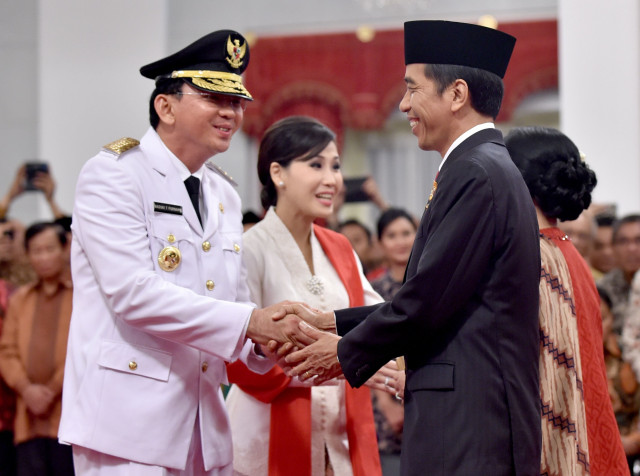Muslim majority Indonesia's capital gets Christian leader
Basuki Tjahaja Purnama swearing in despite weeks of protests from Islamic hardliners

Basuki Tjahaja Purnama, also the first person from the country's tiny ethnic Chinese minority to become leader of Jakarta, was sworn in at a ceremony by President Joko Widodo.
He replaces Widodo, who took office as head of state last month, and like the president was a political outsider without deep roots in the era of dictator Suharto.
The emergence of leaders such as Widodo and Purnama has been praised as a sign that democratic reforms introduced after the end of authoritarian rule in 1998 have taken root.
Purnama, known by his nickname Ahok, was Widodo's deputy and has been acting governor for several months.
However his appointment has not been smooth, with Islamic hardline groups staging regular protests against an "infidel" taking over as governor and political opponents in the city council attempting to block his inauguration.
But the hot-headed, straight-talking governor has shrugged off the challenges to his leadership.
"You can't make everybody happy," he said after his inauguration.
The tall, bespectacled politician promises a starkly different style to his predecessor. While Widodo, known by his nickname Jokowi, took a gentle, persuasive approach, Purnama is famed for his angry outbursts at bumbling officials.
Despite the opposition from Islamic groups, many Jakarta residents support the governor.
They believe it takes a strong leader to fix the problems of the capital, which include a threadbare public transport system, inadequate flood defences and an inefficient bureaucracy.
Scores of people headed to city hall to show their support for the new governor on Wednesday, with a banner that read: "Congratulations on the inauguration of Basuki Tjahaja Purnama".
Having an ethnic Chinese city governor also represents progress in Indonesia, as the minority suffered severe discrimination in the Suharto years.



















COMMENTS
Comments are moderated and generally will be posted if they are on-topic and not abusive.
For more information, please see our Comments FAQ